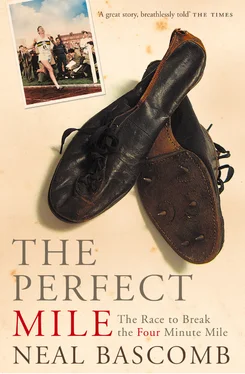On 28 May 1952, Bannister clocked a 1:53 half-mile at Motspur Park with his ‘space-eating stride’. Ten days later he entered the mile at the Inter-Hospitals Meet and won by 150 yards. Maybe he knew what he was doing. The press turned to writing that he would silence his critics at Helsinki and that his training was ‘well-advanced’. Compared to those of the top international 1,500m men, his times were sufficient. His ‘pulverizing last lap’ would likely win the day. Even L. A. Montague, the Manchester Guardian ’s esteemed athletics correspondent, trotted out to explain that Bannister was the ‘more sensitive, often more intelligent, runner who burns himself up in giving of his best in a great race’. Bannister was Britain’s best chance at the gold medal, and Montague wondered, ‘Do [critics] really think that they suddenly know more about him than he knows himself?’
Although he lost an 800m race at White City stadium in early July, the headlines exclaimed, ‘Don’t worry about Bannister’s defeat – he knows what he is doing!’ Ably assisted by the press, Bannister had painted himself into a corner. He was favoured to bring back gold by everyone from the head of the AAA to revered newspaper columnists – and, by association, by his countrymen as well. Of course, there weren’t going to be any scapegoats if he failed. ‘No alibis,’ as Bannister said himself. ‘Victory at Helsinki was the only way out.’ A part of him suspected that he had manoeuvred himself into this tight position on purpose. Come the Olympic final, he would have an expectant crowd, the rush of competition, two years of dedicated training, the expectation that it was his last race before retirement, and nobody to blame but himself if he lost. This was motivation.
By 17 July most of the British Olympic team had left for Finland, team manager Jack Crump declaring upon arrival in Helsinki, ‘We will not let Britain down.’ But, though he would have to join the team soon, Bannister was still in London. Like a few other athletes, he wanted to avoid the media frenzy in the prelude to the Games, and the inevitable waiting around, worrying about upcoming events. His friend Chris Chataway, the 5,000m hopeful, had also delayed his departure. The two scoured London for dark goggles to curtain the twenty-one hours of Scandinavian daylight. Given that one rarely saw the sun in London, it proved a difficult search. Bannister also sought out a morning newspaper.
It didn’t take him long to find a story headline – ‘Semi-Finals for the Olympic 1,500 Metres’ – that confirmed what Norris McWhirter had told him the day before about the added heat. ‘I could hardly believe it,’ Bannister later explained. ‘In just the length of time it took to read those few words the bottom had fallen out of my hopes.’ Worse, he had drawn a tough eliminating heat in the first round.
As he went about his day in the smog-choked London streets, the crisp air and fast tracks he expected to enjoy in Helsinki seemed threateningly close at hand. One could hardly have blamed him had he not wanted to go at all.
2
The essential thing in life is not so much conquering as fighting well.
Baron de Coubertin, founder of the modern Olympic Games
In the narrow concrete tunnel, Wes Santee stuck to his position in the seven-man line, waiting to move forward as the first of the American team marched into Helsinki’s Olympic Stadium through the Marathon Gate. The applause from the stands reverberated in the tunnel, sounding as if the whole of mankind had come to watch the opening ceremony parade. Santee, his feet more accustomed to cowboy boots or track spikes, stepped ahead in white patent leather shoes. His outfit was a departure from his typical attire of Western shirts and jeans. Like the rest of his team-mates, he wore a dark flannel jacket with silver buttons, grey flannel slacks, and a poplin hat whose brim he had folded to make it look more like a cowboy hat.
The 20-year-old University of Kansas sophomore towered over most of those around him. At six foot one inch, with much of that height in his legs, he looked the clean-cut American athlete, buzz cut included. His shoulders were wide, and he bristled with energy. His face easily lit with a smile, and he almost always said what he thought, with a Midwestern twang. One had the sense that he wore his emotions out in the open, but that this vulnerability had a limit buttressed with steel.
That afternoon of 19 July 1952, he was nothing but a bundle of nervous anticipation as he moved towards the tunnel’s mouth. Rain streaked across the opening. He peered past it into the stadium, where hundreds of athletes circled the track. They were dressed in a kaleidoscope of colours and styles: pink turbans, flower-patterned shirts, green and gold blazers, black raincoats, orange hats. It was impossible to tell where each team was from because all the flag inscriptions were in Finnish. Santee could not even pronounce the translation for the United States: Yhdysvaltain. The Soviets were already settled on the infield, wearing their cream suits and maroon ties, lined up as neatly as an army regiment. It was their first Olympics since 1912, and they had made no secret of the fact that they were out to beat the Americans.
Finally Santee cleared the tunnel and moved in file towards the track, his head swivelling about to take in the three-tiered stadium and its seventy thousand spectators. It was an awesome sight, like nothing he had ever witnessed. So many people from so many places, charged with excitement and speaking so many different languages. And they had all come this afternoon simply to watch them march around the track, not even to see them compete. On an electric signboard, the likes of which Santee had seen only a few times, were the words Citius, Altius, Fortius – Faster, Higher, Stronger. He had made it. He was an Olympic athlete representing his country.
After marching around the mud-soaked track, he followed the row of athletes to his spot on the infield for the ceremony’s beginning. He felt as if his eyes weren’t wide enough to take in everything happening around him. This was a long way from Ashland, the farming town deep in the south-western part of Kansas where he was raised. The size of the Helsinki stadium alone was enough to marvel at. He remembered arriving at the University of Kansas for the first time and going to the big auditorium for freshman orientation. He’d been with his team-mate Lloyd Koby, who also came from the kind of small town where electricity was just on its way in and a rooster’s crow was the only wake-up call one knew. Koby had looked across the numerous tiers of seats, gauged the height of the rafters, turned to Santee, and said, ‘Boy, this building would hold a lot of hay.’ It was not so much a joke as the only context they knew. But that auditorium was nothing compared to this place, its steep concrete stands seeming to reach the sky.
At a rostrum on the track in front of Santee, the chairman of the organising committee began to speak, first in Finnish, then in Swedish, French, and English, about the Herculean efforts that had gone into these Games. His countrymen had cleared forests, put up hundreds of new buildings of stucco, granite, and steel, enlisted thousands of volunteers, and opened their homes to strangers from around the globe. The stadium in which the opening ceremony was taking place had been the chief target of Russian bombers at the start of the Second World War because of its symbolic value. Now it was once again alive with people, anxious for the competition to commence.
The chairman finished his speech by introducing Finland’s president, who stood at the microphone and announced, ‘I declare the Fifteenth Olympic Games open!’ To the sound of trumpets, the Olympic flag with its five interlocking circles was raised on the stadium flagpole. Then a twenty-one-gun salute boomed. As its echo dissipated, 2,500 quaking pigeons were released from their boxes to swoop and pivot in the air. Santee looked skyward as the birds escaped one by one, carrying the message that the Olympics had begun.
Читать дальше












